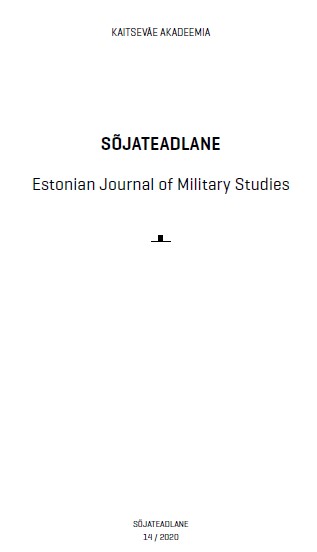VENEMAA STRATEEGILISED NARRATIIVID BALTI RIIKIDELE SUUNATUD MÕJUTUSTEGEVUSES COVID-19 KRIISI AJAL
COVID-19 IN RUSSIA’S INFLUENCE OPERATIONS TARGETING BALTIC STATES: STRATEGIC NARRATIVES
Author(s): Holger Mölder, Vladimir SazonovSubject(s): Media studies, Government/Political systems, International relations/trade, Political behavior, Comparative politics, Health and medicine and law, Politics and Identity
Published by: Kaitseväe Akadeemia (KVA)
Keywords: Covid-19; Russia; Baltic states; political and economic motives; Russian media; pre-crisis economic standards; managing crises;
Summary/Abstract: The strategic narratives constructed and disseminated by the Russian Federation and targeting the Baltic states (i.e., Estonia, Latvia and Lithuania) usually emphasise: 1) political and economic motives related to the policies of their governments; 2) motives to disrupt the international system and Western political institutions with Baltic membership; 3) motives indicating conflicting identities of Russian and Baltic nations, which have often been framed in a Russophobic context. These motives reflect the strategic objectives of the Russian Federation, aiming to disrupt and dismantle the unity of the European Union and increase ideological fragmentation. The Baltic states have become an important and vulnerable target for the influence operations conducted by the Kremlin because those countries are home to a considerable Russian-speaking minority. Based on the analysis of sixteen articles published in the Russian media, the central message seems to attempt to convince the audience that the Estonian, Latvian and Lithuanian economies depend on future assistance from abroad to restore their pre-crisis economic standards, but the EU is neither interested nor able to provide this assistance. The Baltic governments are shown as incompetent in managing crises, and after this one they might face shrinking economies with increasing levels of unemployment and emigration. Additionally, Russian and pro-Russian media outlets have also discussed the Russophobic motives attributed to the Baltic states. During the outbreak and spread of COVID-19, such articles have attempted to fuel mistrust towards the Baltic governments and civil society organizations, not to mention Western liberal democracy and its institutions (e.g., NATO, and the EU). During the COVID-19 crisis, propaganda messages from Russia sought to demonstrate and highlight incompetent leadership and management, as well as poor of cooperation and sustainability among the Baltic states. Overall, Russian’s strategic objectives in the Baltics during the COVID-19 crisis do not seem to differ significantly from their overarching strategic goals in the last two decades, and we do not expect a significant change in narratives disseminated by Russian influence operations in the near future.
Journal: Sõjateadlane
- Issue Year: 2020
- Issue No: 14
- Page Range: 197-225
- Page Count: 29
- Language: Estonian

